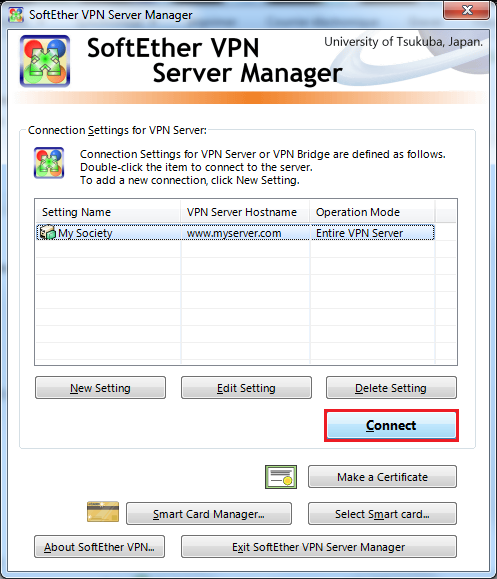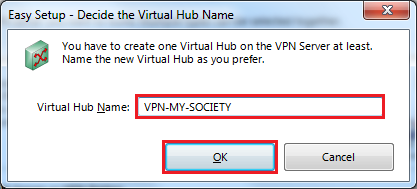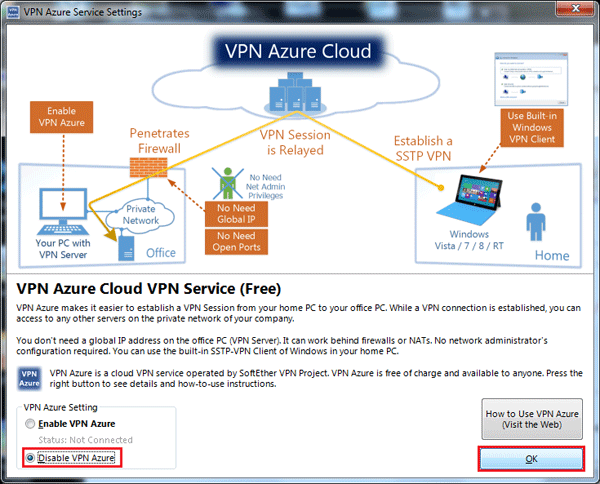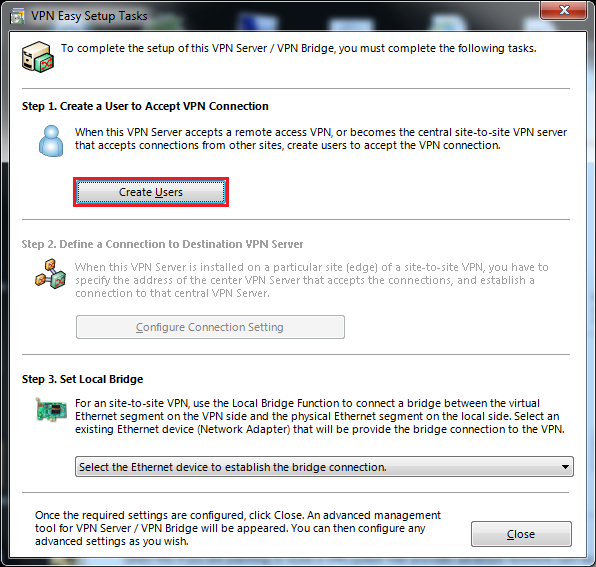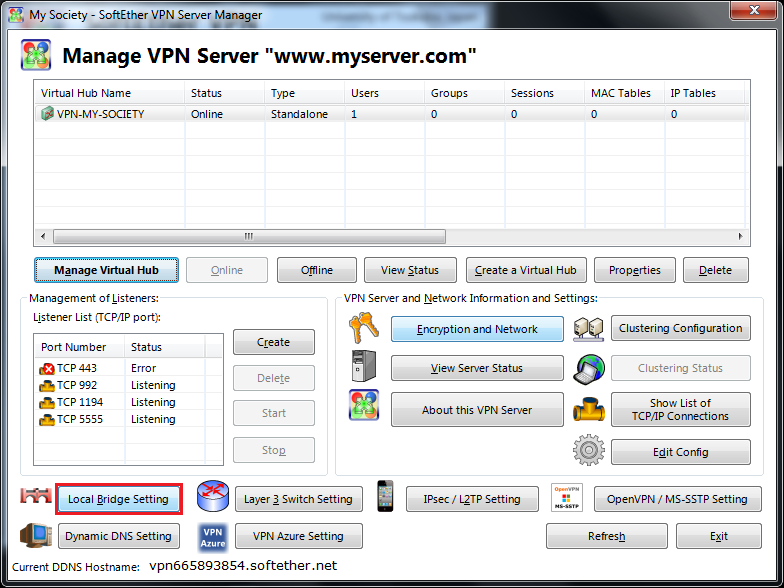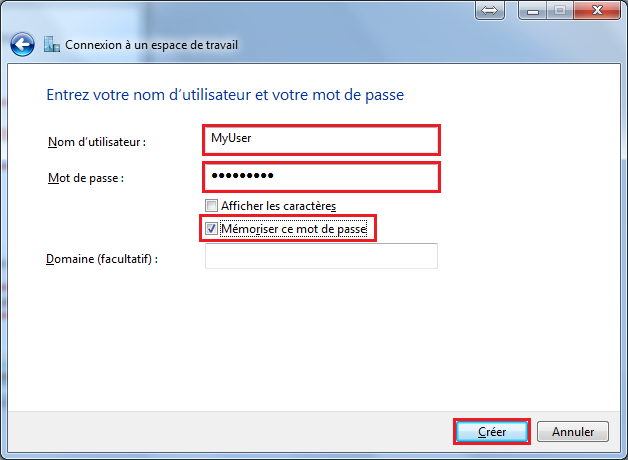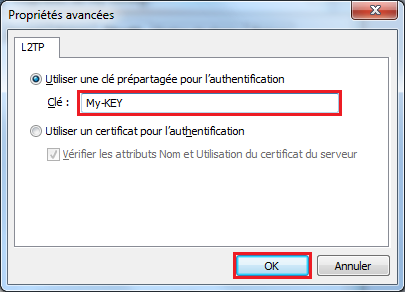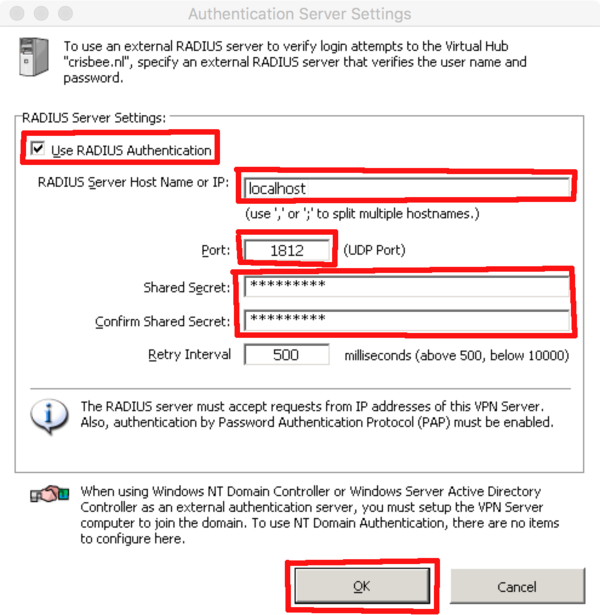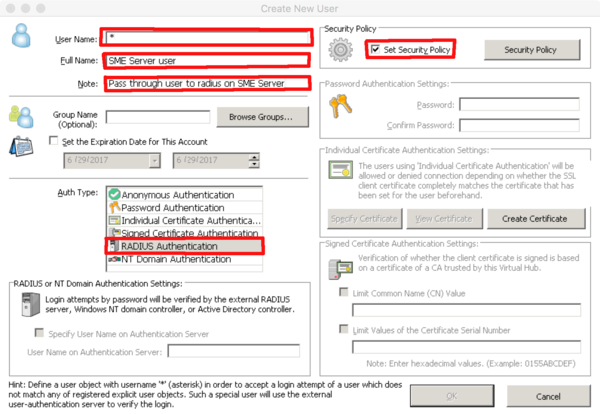Difference between revisions of "SoftEther VPN"
(→TODO) |
|||
| Line 290: | Line 290: | ||
==Radius authentication== | ==Radius authentication== | ||
First set the Radius server credentials (thus the info of SME Server itself) | First set the Radius server credentials (thus the info of SME Server itself) | ||
| − | host: | + | host: localhost |
UDP port 1812 | UDP port 1812 | ||
key: default shared secret that can be found with: | key: default shared secret that can be found with: | ||
Revision as of 10:15, 28 June 2017
Maintainer
This howto has been developed by Olivier Beeckmans
Sources info are located here : http://www.softether.org/
Placeholder for http://forums.contribs.org/index.php/topic,52134.0.html
Status
Description
SoftEther VPN ("SoftEther" means "Software Ethernet") is one of the world's most powerful and easy-to-use multi-protocol VPN software.
It runs on Windows, Linux, Mac, FreeBSD and Solaris. SoftEther VPN is open source. You can use SoftEther for any personal or commercial use for free charge.
SoftEther VPN is an optimum alternative to OpenVPN andMicrosoft's VPN servers.
SoftEther VPN has a clone-function of OpenVPN Server.
You can integrate from OpenVPN to SoftEther VPN smoothly.
SoftEther VPN is faster than OpenVPN. SoftEther VPN also supports Microsoft SSTP VPN for Windows Vista / 7 / 8 / 10.
No more need to pay expensive charges for Windows Server license for Remote-Access VPN function.
SoftEther VPN can be used to realize BYOD (Bring your own device) on your business.
If you have smartphones, tablets or laptop PCs, SoftEther VPN's L2TP/IPsec server function will help you to establish a remote-access VPN from your local network.
SoftEther VPN's L2TP VPN Server has strong compatible withWindows, Mac, iOS and Android.
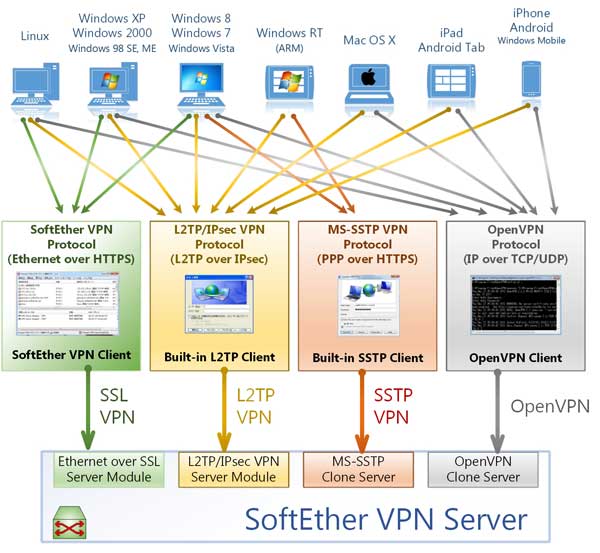
Processing
Step to install and run SoftEther
Configure Port Forwarding
In SME Server Manager set the following rules under Security -> Port Forwarding:
| Protocol | Source Port(s) | Destination Host IP Address | Destination Port(s) | Allow Hosts | Rule Comment | Action |
| TCP | 1194 | localhost | 1194 | SoftEther OpenVPN | ||
| TCP | 5555 | localhost | 5555 | SoftEther Management | ||
| UDP | 1194 | localhost | 1194 | SoftEther OpenVPN | ||
| UDP | 500 | localhost | 500 | SoftEther SoftEther L2TP/IPSec | ||
| UDP | 1701 | localhost | 1701 | SoftEther SoftEther L2TP/IPSec | ||
| UDP | 4500 | localhost | 4500 | SoftEther SoftEther L2TP/IPSec |
or you can manually add the portforwarding rules:
db portforward_tcp set 1194 forward Comment 'SoftEther OpenVPN' DestHost localhost DestPort 1194 AllowHosts ' ' DenyHosts ' ' db portforward_tcp set 5555 forward Comment 'SoftEther Management' DestHost localhost DestPort 5555 AllowHosts ' ' DenyHosts ' ' db portforward_udp set 1194 forward Comment 'SoftEther OpenVPN' DestHost localhost DestPort 1194 AllowHosts ' ' DenyHosts ' ' db portforward_udp set 500 forward Comment 'SoftEther SoftEther L2TP/IPSec' DestHost localhost DestPort 500 AllowHosts ' ' DenyHosts ' ' db portforward_udp set 1701 forward Comment 'SoftEther SoftEther L2TP/IPSec' DestHost localhost DestPort 1701 AllowHosts ' ' DenyHosts ' ' db portforward_udp set 4500 forward Comment 'SoftEther SoftEther L2TP/IPSec' DestHost localhost DestPort 4500 AllowHosts ' ' DenyHosts ' ' signal-event portforwarding-update
Download, Install and Run SoftEther
Install needed tools
yum install gcc
cd /opt wget http://www.softether-download.com/files/softether/v4.20-9608-rtm-2016.04.17-tree/Linux/SoftEther_VPN_Server/32bit_-_Intel_x86/softether-vpnserver-v4.20-9608-rtm-2016.04.17-linux-x86-32bit.tar.gz tar zxvf softether-vpnserver-v4.20-9608-rtm-2016.04.17-linux-x86-32bit.tar.gz cd vpnserver make # Read and Accept License Agreement, after compile (1 min) ./vpnserver start
cd /opt wget http://www.softether-download.com/files/softether/v4.20-9608-rtm-2016.04.17-tree/Linux/SoftEther_VPN_Server/64bit_-_Intel_x64_or_AMD64/softether-vpnserver-v4.20-9608-rtm-2016.04.17-linux-x64-64bit.tar.gz tar zxvf softether-vpnserver-v4.20-9608-rtm-2016.04.17-linux-x64-64bit.tar.gz cd vpnserver make # Read and Accept License Agreement, after compile (1 min) ./vpnserver start
Remove gcc for security reasons:
yum remove gcc cloog-ppl cpp libgomp mpfr ppl
Finishing Installation On Windows
Download Management Interface
http://www.softether-download.com/files/softether/v4.20-9608-rtm-2016.04.17-tree/Windows/SoftEther_VPN_Server_and_VPN_Bridge/softether-vpnserver_vpnbridge-v4.20-9608-rtm-2016.04.17-windows-x86_x64-intel.exe
For the latest versions of SoftEther components please check http://www.softether-download.com/en.aspx
After installation Clic On New Setting
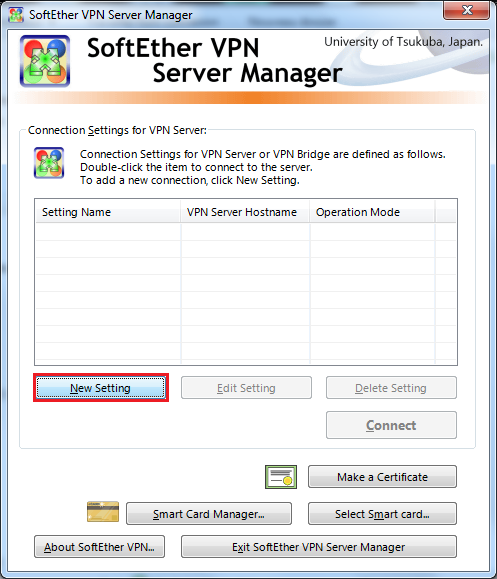
Set Setting Name, Set Host Name, Choose Port Number 5555
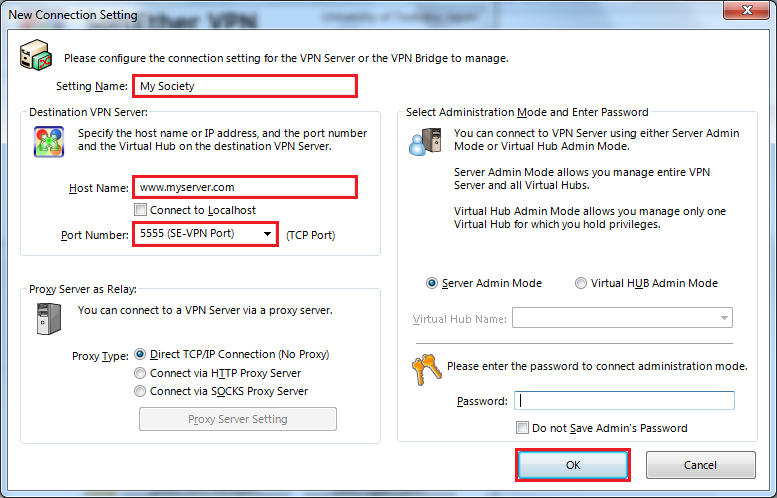
Choose Remote Access VPN Server
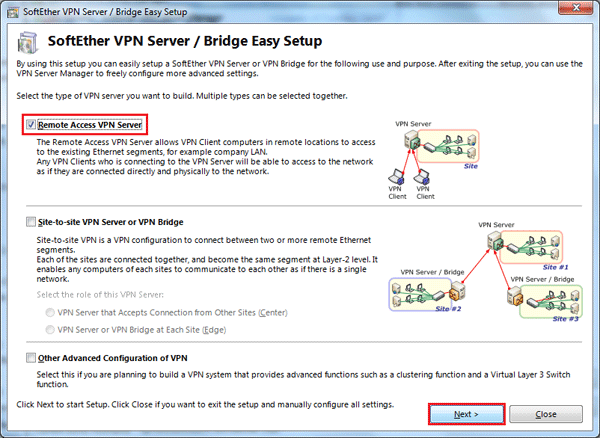
Set Dynamic DNS if Needed (Dynamic IP)
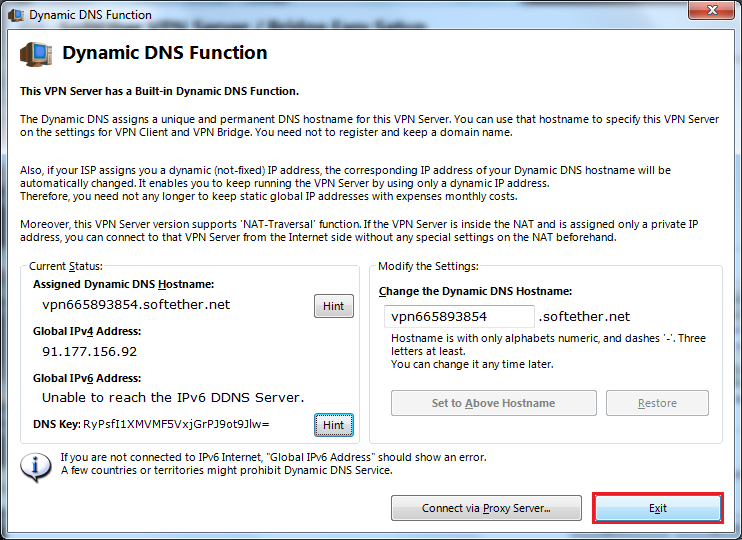
Enable L2TP/IPSec And Create Pre-Shared Key (No More Of 10 Charactere for compatibility with Android)
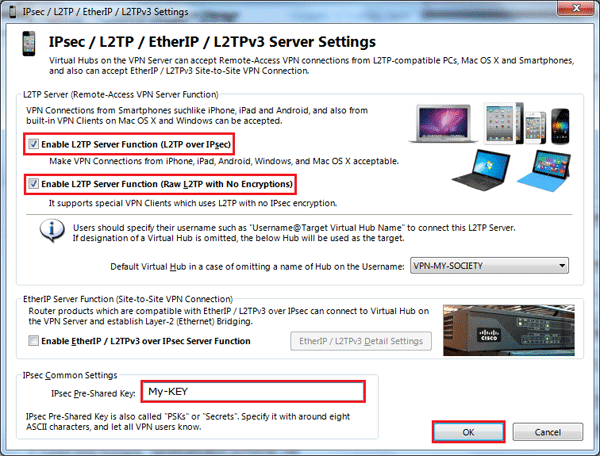
Set User Name, Autentification Method, Password
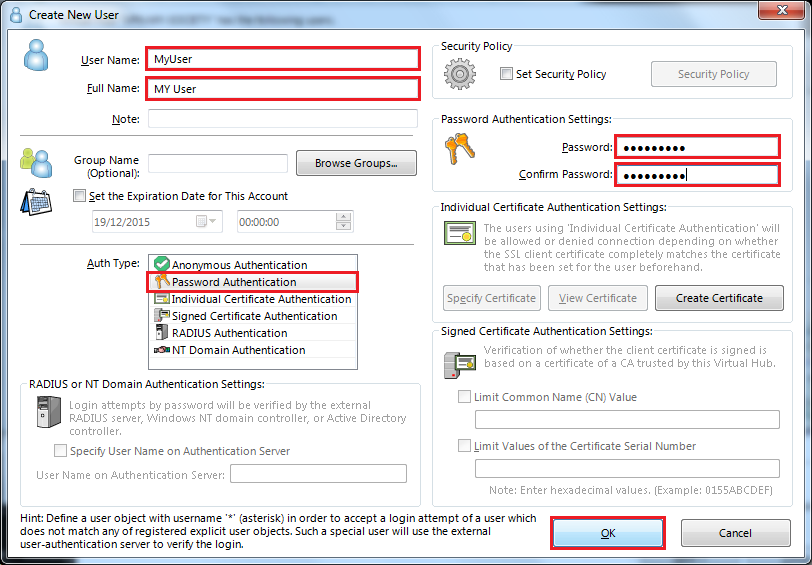
Create Local Bridge
Choose Virtual Hub, Choose Bridge With Tap Device, Set Tap Device Name : soft
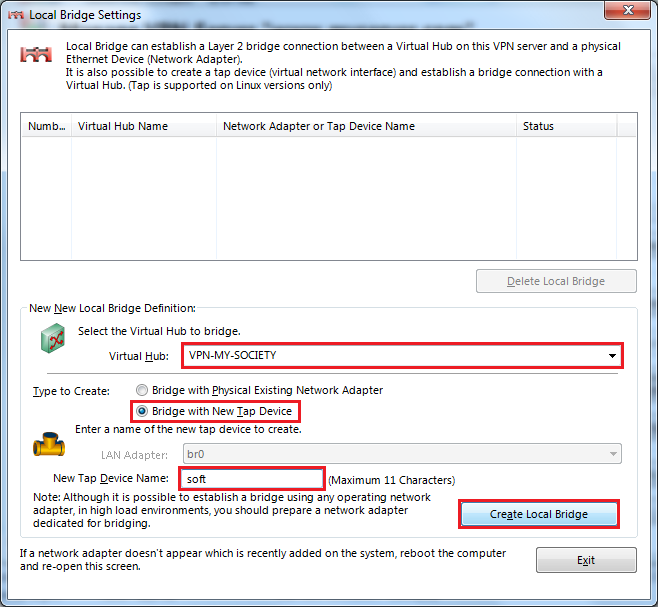
Check On SME
# ifconfig
tap_soft Link encap:Ethernet HWaddr 00:AC:0D:17:8E:2D
UP BROADCAST RUNNING MULTICAST MTU:1500 Metric:1
RX packets:0 errors:0 dropped:0 overruns:0 frame:0
TX packets:0 errors:0 dropped:0 overruns:0 carrier:0
collisions:0 txqueuelen:500
RX bytes:0 (0.0 b) TX bytes:0 (0.0 b)
Auto Start SoftEther vpnserver
nano /etc/init.d/vpnserver
#!/bin/sh
#
### BEGIN INIT INFO
# Provides: vpnserver
# Default-Start:
# Default-Stop:
# Should-Start: portreserve
# Required-Start: $network
# Required-Stop:
# Short-Description: Start and stop the vpnserver server
# Description: SoftEther VPN Server.
### END INIT INFO
DAEMON=/opt/vpnserver/vpnserver
LOCK=/var/lock/subsys/vpnserver
test -x $DAEMON || exit 0
case "$1" in
start)
$DAEMON start
touch $LOCK
;;
stop)
$DAEMON stop
rm $LOCK
;;
restart)
$DAEMON stop
sleep 3
$DAEMON start
;;
*)
echo "Usage: $0 {start|stop|restart}"
exit 1
esac
exit 0
Start In Run Level 7
chmod 755 /etc/init.d/vpnserver ln -s /etc/init.d/vpnserver /etc/rc7.d/S79vpnserver
Download And Install Bridging
More info is required and needs to be explained why the bridging is needed, if at all.
For SME 9.x 32 Bits
rpm -i http://mirror.contribs.org/releases/9.2/smecontribs/i386/RPMS/smeserver-bridge-interface-0.2-1.el6.sme.noarch.rpm --nodeps signal-event post-upgrade; signal-event reboot
For SME 9.x 64 Bits
rpm -i http://mirror.contribs.org/releases/9.2/smecontribs/x86_64/RPMS/smeserver-bridge-interface-0.2-1.el6.sme.noarch.rpm --nodeps signal-event post-upgrade; signal-event reboot
Configure Bridging and restart
# config setprop bridge ethernetInterface YOUR_LAN_INTERFACE # config setprop bridge tapInterface tap_soft # /etc/init.d/bridge restart
Show bridge config settings
# db configuration show bridge
Check Bridge
# brctl show
bridge name bridge id STP enabled interfaces
br0 8000.00ac0d178e2d no em1
tap_soft
Test With Windows
Create VPn Connection
Set Internet Address and Destination Name, clic do not connect now and Next

Set Property On Your VPN Connection

Choose VPN Network Type and clic on Advanced Settings
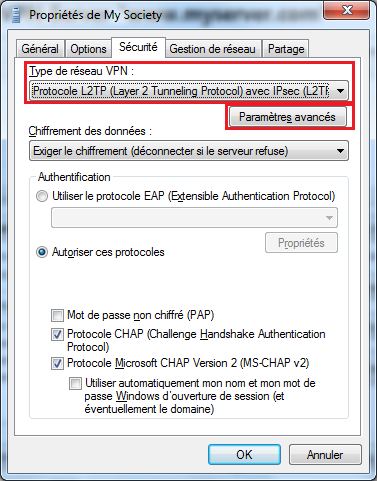
Make A Connection and Check State
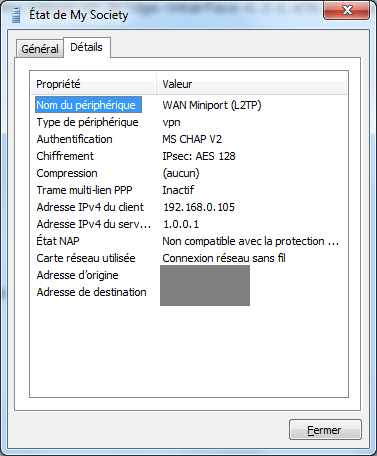
You can now access your samba ressources !
Radius authentication
First set the Radius server credentials (thus the info of SME Server itself)
host: localhost UDP port 1812 key: default shared secret that can be found with: cat /etc/radiusclient-ng/servers
Secondly create a 'passthrough user' with the username of '*', set Auth Type to Radius and enable security policy. The default policy enables allows all SME Server users.
If you previously created SME Server users manually, you can delete these so there is ONLY one user called '*'
All SME Server users should now be able to create a VPN connection. Since Softether VPN is not 'integrated' yet into the db and templating system, one does not need to enable VPN access on SME Server user accounts. This option in Server Manager will be ignored by Softether VPN. By default when authenticating against the SME Server Radius server all users will be able to create a VPN connection.
TODO
Create a rpm with softether vpnserver RTM
Create a rpm with a bridge for softether (The smeserver-bridge-interface can do this)
Use SME Radius
Hints and tips
- Using the native MS-SSTP VPN possibility on windows, one must use not just the username but username@virtualhub_name
